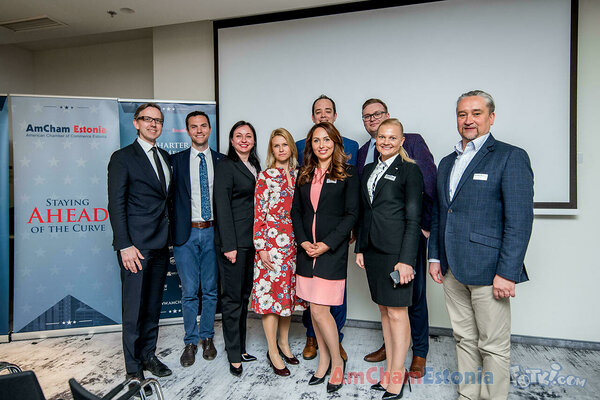The COVID-19 pandemic has completely altered the world’s socio-economic landscape, changing everything. The future is unknown - the future of health, work, tourism, education, and the economy as a whole. The truth is that the future does not exist yet, and we have to build it ourselves. We have an opportunity to build a stronger, more resilient economy that reflects our key economic values - trust, innovation, and transparency.
This is why we are organising this hackathon. The U.S. Embassies in Copenhagen, Riga, Tallinn and Vilnius are collaborating with the local entrepreneurial leaders to engage creative go-getters and organizations all around the world. We aim to support the innovation ecosystem that will redefine the terms of the future. We call it a hackathon, but it goes way beyond that. As winning teams will have an opportunity to access a post-hackathon support program, their game-changing business ideas will have a boost from the beginning and a chance to create real impact.
The U.S. Embassies supporting this programme are explaining why they are behind this hackathon: “Innovation is a cornerstone of the American DNA and has, throughout history, helped us get through many challenges. The U.S. Embassies in Copenhagen, Riga, Tallinn and Vilnius envision the “48 for the Future Hackathon” as a unique opportunity to promote collaboration on identifying solutions to the real economic challenges communities around the world are facing in light of the COVID-19 pandemic. We believe a virtual hackathon is the perfect platform to connect at this time of uncertainty, and we hope through this, we can assist in bringing innovators together to build solutions and bring them to reality. This is why we’ve partnered with some of the best in the region – Garage48 and Startup Wise Guys – to make it all happen. Join us. Bring your friends, your ideas, and your energy, and let’s do something big. Together.”
The latest research and trend reports say people are increasingly looking to individuals and entrepreneurs to solve the world’s most complex problems. People put their trust into socially conscious problem solvers to stop the media industry and institutionalised organisations navigate and narrate COVID-19; and build a more trustworthy base for the future.
Today individuals can act in ever-more targeted and personally meaningful ways to support the communities and causes of their choice - this includes becoming entrepreneurs for a good cause or supporting the ones they feel closest to. Firms and consumers increasingly demand that organizations leave a positive impact and mirror our values. This hackathon offers a large range of challenges - participants can select a subject or challenge that speaks to you the most.
Future of trusted networks, for example, is one of the pre-defined topics to be addressed. The hunger for accessing clean and accurate information has never been to the extent since digitalization. All over the world, people have invaded online channels as a key news source to understand the latest updates on the COVID-19 global health pandemic. According to the Nilesen report, in March 2020, Americans registered 215% longer time spent online on mobile devices accessing current events and global news, compared to March 2019. Obviously, this also meant audiences were growing for media sellers. And for ad buyers, reaching their desired and highly engaged audience has never been easier. Therefore, millions of people were exposed to a lot of irrelevant and misleading information in the search of truth.
Education is another key topic to be approached very delicately. The COVID-19 pandemic has created the largest disruption of education systems in history, affecting nearly 1.6 billion learners in more than 190 countries across all continents. It is essential to attend to the educational needs of children and youth during and after the crisis by formulating adaptive, coherent, effective and equitable education responses that can be adapted for a range of situations.
“While edtech solutions have brought some good ideas into the remote-education world, they rely on technologies that many families do not have access to. When parents have to focus on bringing the daily bread to the table, kids often struggle on their own, which might leave them falling behind, or even worse, dropping out. Not all skills can be taught well online, and even after training the teachers on how to use online tools, the materials and curricula still have to be adjusted to fit online teaching.” said Triin Preem, Garage48 Project Manager and the key coordinator of the event.
An educated population is the keystone for building the infrastructure for the future. As the UN stresses, preventing a learning crisis from becoming a generational catastrophe requires urgent action from all. It is obvious that today’s kids and youth will define the future of work life and shape the quality of organisational and developmental values. On the other hand, the nature of how we work is already changing, and the coronavirus pandemic will have a lasting impact on the subject for some time. New cost-saving measures, nonstandard work models, rise in contractor employee base, the organisational shift to more remote work operations - there are so many burning subtopics to be addressed to adjust to “futuristic” work trends.
Even though all business lines have struggled due to the pandemic, some were more affected than others. The tourism and entertainment sectors have been heavily impacted due to the nature of their operations - once physical and local contact was eliminated, many companies had to find non-traditional ways to keep their businesses alive. Many institutions have turned to the vast potential of the Internet to keep things ticking. Beijing-based X Museum, for example, was one of the first to implement an online exhibition which has created a gamified online museum experience. While online exhibitions will have their place in the future, we cannot really travel online - it would be a poor substitute for the real experience. Many experts are working on diverse recovery scenarios for the travel and hospitality industries; but shouldn’t there also be a more resilient, crisis-proof future for these sectors? Not only for the sake of the future of the service industry; but also for our dependency on these sectors for psychological and experiential reasons.
It is not possible or fair to judge who had the hardest hit during this pandemic, but let’s be honest, small and medium-sized enterprises (SMEs), especially the ones operating in the service industries, have faced major disruptions due to COVID-19. In the United States, 78% of net employment growth between 2013 and 2018 was generated by companies less than five years old. Unfortunately, the crisis has meant that SMEs have fewer cash reserves to maintain employee salaries and have more trouble navigating and accessing channels of aid. These businesses are the lifeblood of employment growth and equipped with our cultural values. Many SMEs might disappear, especially those in certain sectors. Maybe we can lead the way to further improve their traditional technologies and service platforms and help them gain the ability to digitise parts of their business models. Maybe we can improve the outlook for this critical part of the global economy. Because, only the few SMEs or startups working with deep technology will be significantly better off.
Daria Sivovol, CEO of American Chamber of Commerce (AmCham) Estonia - the Community Partner of the event - emphasizes the timelines and necessity of this hackathon: “COVID-19 pandemic has changed the way we live our lives, function, run our businesses and manage people. We had to adjust quickly to navigate in the new reality. We don’t know what the future will bring, but one thing we know for sure - we need to work together and prepare ourselves, find new ways and innovative solutions. And to achieve this, we need to put our heads together and tackle this jointly! This hackathon is a great opportunity to unite all of us not only in Europe, but also across the Atlantic, around the world.”
We indeed trust that this cross-continent cooperation will result in building cross-functional solutions for a better world and a more resilient economy. Last but not least, we should remember that economic recovery will also depend heavily on protecting public health. Meanwhile the future of the healthcare sector itself is being changed rapidly. During the pandemic many people were advised to avoid hospitals to stay healthy! And today, hospitals are fundamentally restructuring how they prevent, diagnose and cure diseases. They are discussing not only how to employ new developments and strict regulations, but also how to adopt new technologies and innovative solutions. And through this hackathon, we are holding a chance to have a saying in it.
Humankind has reached a turning point in its ongoing journey to preserve and improve the quality of life. The entire world is analyzing, narrating and disrupting the future. We can do more than sit back and watch the world changing around us. We can be a part of the change. We can lead the change.
This is your chance to register, submit your idea and join the game.

